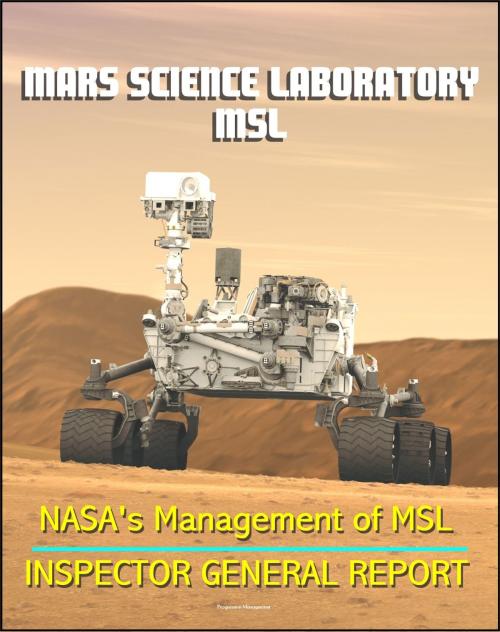NASA's Management of the Mars Science Laboratory Project (MSL): Inspector General Report on Technical and Financial Problems with Mars Exploration Program Rover
Nonfiction, Science & Nature, Science, Physics, Astronomy, Social & Cultural Studies, Political Science, Government| Author: | Progressive Management | ISBN: | 9781458176264 |
| Publisher: | Progressive Management | Publication: | June 9, 2011 |
| Imprint: | Smashwords Edition | Language: | English |
| Author: | Progressive Management |
| ISBN: | 9781458176264 |
| Publisher: | Progressive Management |
| Publication: | June 9, 2011 |
| Imprint: | Smashwords Edition |
| Language: | English |
NASA's Office of Inspector General issued this status report on the Mars Science Laboratory (MSL) slated for launch in late 2011. The Mars Science Laboratory (MSL), part of the Science Mission Directorate’s Mars Exploration Program (Mars Program), is the most technologically challenging interplanetary rover ever designed. This NASA flagship mission, whose life-cycle costs are currently estimated at approximately $2.5 billion, will employ an array of new technologies to adjust its flight while descending through the Martian atmosphere, including a sky crane touchdown system that will lower the rover on a tether to the Martian surface.
The report states: Project managers expected to complete integration of equipment by May 2011 and ship MSL to Kennedy for flight preparation by June 2011. However, of the ten issues Project managers identified as contributing to the launch delay, as of March 2011 three remained unresolved: contamination of rock and soil samples collected by the Sample Acquisition/Sample Processing and Handling (SA/SPaH) subsystem and development of flight software and the fault protection systems. The resolution of these and other issues that may arise during final integration is likely to strain the already limited margin managers built into the Project’s schedule to allow for unanticipated delays. Moreover, since November 2009 this schedule margin has been decreasing at a rate greater than planned. Fault protection enables an instrument or system that does not operate as expected to operate at a reduced level rather than fail completely. In addition, approximately 1,200 reports of problems and failures observed by Project personnel remained open as of February 2011. If these reports are not resolved prior to launch, there is a possibility that an unknown risk could materialize and negatively affect mission success. Finally, since the 2009 decision to delay launch, the Project has received three budget increases, most recently an infusion of $71 million in December 2010. However, in our judgment because Project managers did not adequately consider historical cost trends when estimating the amount required to complete development, we believe the Project may require additional funds to meet the 2011 scheduled launch date.
NASA's Office of Inspector General issued this status report on the Mars Science Laboratory (MSL) slated for launch in late 2011. The Mars Science Laboratory (MSL), part of the Science Mission Directorate’s Mars Exploration Program (Mars Program), is the most technologically challenging interplanetary rover ever designed. This NASA flagship mission, whose life-cycle costs are currently estimated at approximately $2.5 billion, will employ an array of new technologies to adjust its flight while descending through the Martian atmosphere, including a sky crane touchdown system that will lower the rover on a tether to the Martian surface.
The report states: Project managers expected to complete integration of equipment by May 2011 and ship MSL to Kennedy for flight preparation by June 2011. However, of the ten issues Project managers identified as contributing to the launch delay, as of March 2011 three remained unresolved: contamination of rock and soil samples collected by the Sample Acquisition/Sample Processing and Handling (SA/SPaH) subsystem and development of flight software and the fault protection systems. The resolution of these and other issues that may arise during final integration is likely to strain the already limited margin managers built into the Project’s schedule to allow for unanticipated delays. Moreover, since November 2009 this schedule margin has been decreasing at a rate greater than planned. Fault protection enables an instrument or system that does not operate as expected to operate at a reduced level rather than fail completely. In addition, approximately 1,200 reports of problems and failures observed by Project personnel remained open as of February 2011. If these reports are not resolved prior to launch, there is a possibility that an unknown risk could materialize and negatively affect mission success. Finally, since the 2009 decision to delay launch, the Project has received three budget increases, most recently an infusion of $71 million in December 2010. However, in our judgment because Project managers did not adequately consider historical cost trends when estimating the amount required to complete development, we believe the Project may require additional funds to meet the 2011 scheduled launch date.















